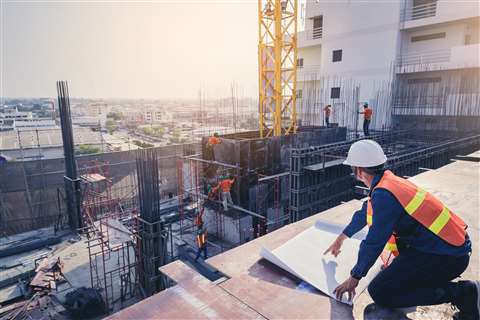Five predictions for the construction industry in 2023
31 January 2023
Following an unpredictable 2022, Håvard Haukeland, co-founder of Spacemaker and senior director at Autodesk, looks ahead into some key challenges and opportunities that we can expect to see in 2023.
 Photo: AdobeStock
Photo: AdobeStock
The landscape of construction has changed drastically in recent years, especially driven on by the pandemic and the more recent supply chain crisis as a result of the Russia/Ukraine conflict.
The constantly changing landscape means that predicting the future of construction is always a challenge, but there are trends that point to where the industry is heading in the next 12 months.
Architects will utilise sustainability tools
Buildings are being required to ‘perform’ in more ways than ever before - environmentally, socially and economically.
Whether it’s about improving energy efficiency, lowering carbon footprints or density requirements, we’ll see more optimisation of designs to reach specific outcomes.
We’ll see new sustainability tools on the rise that are helping architects reach their performance targets.
Whether they’re developed in-house, or are an existing product, these tools give architects more insights earlier on in the design process, empowering them to take sustainability strategies in their own hands and, as a result, lead the way in sustainable design.
This is also where vernacular architecture could potentially inspire exciting new local strategies needed in the face of climate change, from preparing for heatwaves to building with bio-based materials.
New typologies will be created at all scales, from an individual building to a neighbourhood, and new ways of making buildings and cities, affecting both the process and the outcome.
Think more irregular-shaped architecture or mixed-density blocks.
Increased emphasis on sustainability regulations
Across Europe, governments are taking more regulatory action to accelerate meeting sustainability goals.
Rising energy costs mean energy efficiency, fast tracking the energy transition and decarbonisation will become more prioritised. As such, architects continue to play a vital role in delivering on sustainability targets.
More sustainable building practices to materialise
Meanwhile, climate change is already having a significant impact on our day-to-day lives. In 2022, we experienced one of the hottest summers on record, and at current rates, we can only expect things to continue heating up.
 Håvard Haukeland, co-founder of Spacemaker and Senior Director at Autodesk. (Photo: Autodesk/Spacemaker)
Håvard Haukeland, co-founder of Spacemaker and Senior Director at Autodesk. (Photo: Autodesk/Spacemaker)
Microclimate analysis provides architects with insights on how projects will impact local climates, an important tool in urban planning as architects will want to find ways to keep the local population cool in the summer - especially as it is now mandatory in UK Government regulation.
In addition, with new homes in the UK now required to produce 30% less CO2 emissions, architects must consider how they can reduce emissions in the earliest phases of design.
I would expect to see more opportunities to optimise sustainable features in new builds – such as solar panels – to keep emissions within regulations.
Digital transformation will bring innovation to the constrution industry
New digital, data-driven tools continue to expand the architect’s toolkit, helping them work more effectively to achieve better outcomes be it for sustainable design or visualisations.
A must for any new software will be interoperability with existing tools, and even with traditional techniques such as hand sketching.
Smooth workflows across tools, processes and collaborators will be key for a successful digital transformation.
AI and automation will play a greater role in the design process, helping architects by predicting outcomes and taking over tedious tasks such as number crunching or sourcing data, while freeing up more time for them to focus on design work.
New digital processes will potentially enable architects to rethink their business models, by testing new fee structures and diversifying their services.
All this means more firms will invest in innovation officers and digital strategists to ensure a cohesive approach to architecture, business and technology.
Data will grow in importance
The issues of sustainability, biodiversity, climate change, and urbanisation are too complex to solve alone.
Facilitating an interdisciplinary, collaborative approach connected by data results in a new collective intelligence.
Cloud-based platforms will enable better ways of communication and collaborating allowing teams to contribute anytime, from anywhere – imperative when it comes to supporting the hybrid post-pandemic workplace.
We expect to see more and more companies embracing the cloud and cloud-based products; hybrid workflows will connect desktop and cloud products to create smoother and more data-driven workflows.
 Photo: AdobeStock
Photo: AdobeStock
In this collective environment, the shared language will be data. To ensure data is usable by everyone, the team needs to be able to access it in an intuitive, centralised and interoperable way.
We see data becoming more important in the decision-making process, helping architects reach better outcomes to solve complex societal challenges.
Data will improve collaboration by boosting trust and transparency in the team and facilitating more constructive dialogues be they with the client, municipality or internally, which benefits the whole project life cycle.
At the end of the day, it results in better buildings, neighbourhoods and cities that are better equipped for what uncertainties and opportunities the future may bring.
STAY CONNECTED



Receive the information you need when you need it through our world-leading magazines, newsletters and daily briefings.
CONNECT WITH THE TEAM







